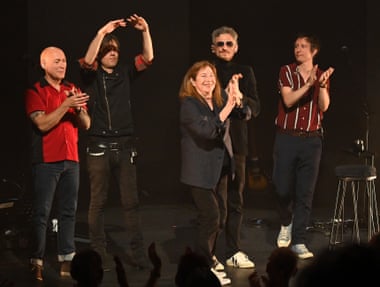It is testament to the joy of Jane Birkin’s voice that when the singer runs through a stream of thank-yous towards the end of her 90-minute show at London’s Barbican on Saturday evening, it sounds every bit as pleasing as any of the songs that have preceded it. She thanks the band, the lighting director, the venue, the audience. “You can’t imagine how happy it makes you feel to see your faces,” she tells them. “It’s just so terribly touching. Enough to go on for the rest of my life.”
Coupling an English crispness with the soft pitter-patter of her adopted French homeland, Birkin’s voice has been the stuff of wonder since the release of Je t’aime … moi non plus, her sybaritic 1969 duet with Serge Gainsbourg. The song is not played this evening, but is somehow implicit in everything she does – there as she takes to the stage to play its B-side, Jane B, and in her frequent references to Gainsbourg himself.
There are plenty of bewitching numbers from her back catalogue, La Ballade de Melody Nelson and Ex-fan des Sixties among them. But what is striking this evening is how contemporary Birkin appears. The most electrifying moments come from Oh! Pardon tu dormais …, last year’s album made with the French pop legend Étienne Daho, which looked with wisdom, wit and steady grace at some of the harder moments of her life: the loss of her daughter, Kate, and the loss of Gainsbourg among them.
Tonight, there is something remarkable in the focus and poise she brings to tracks such as Cigarettes, Catch Me If You Can, and Ghosts. When Daho himself appears to duet on the album’s title track, he stands all in black at the back of the stage, Birkin alternately singing to the shadows of him, then out to the brightness of the crowd, and, at times, simply to herself.
A second encore brings her back to stand alone in a column of light and sing the piano ballad Pourquoi?. As she is wreathed in stage-smoke, her voice sweet with regret, it’s an extraordinary meeting of breath and air.

